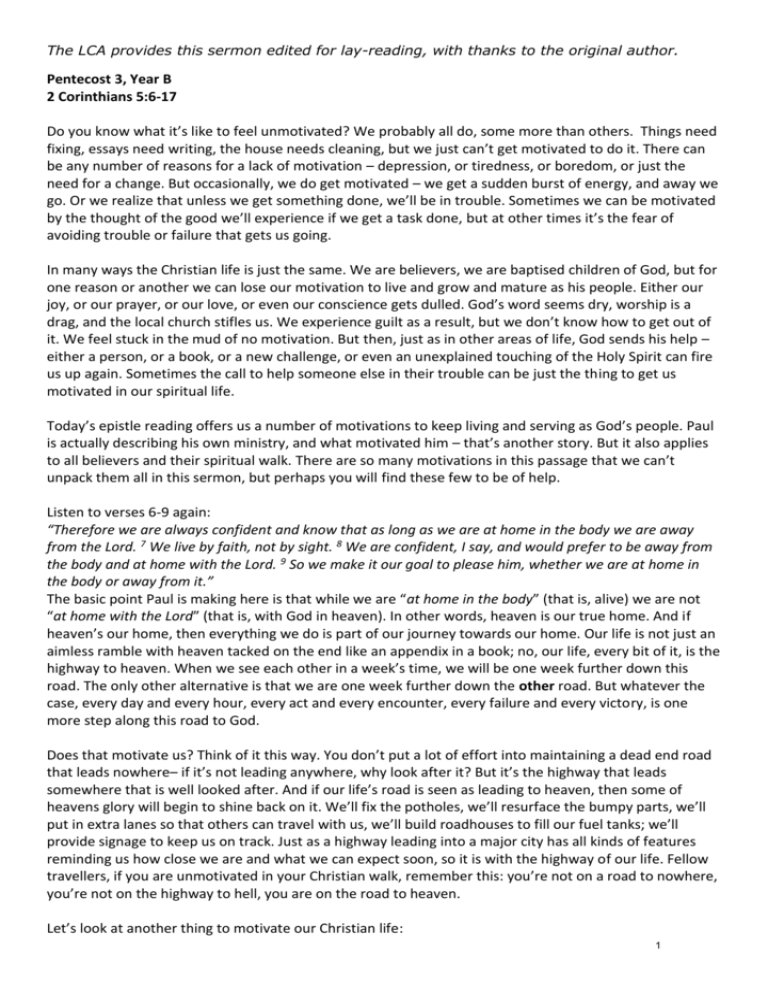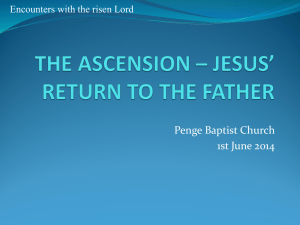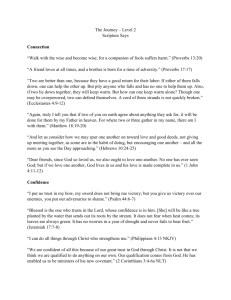sermon - 2 corinthians 5 6-17
advertisement

The LCA provides this sermon edited for lay-reading, with thanks to the original author. Pentecost 3, Year B 2 Corinthians 5:6-17 Do you know what it’s like to feel unmotivated? We probably all do, some more than others. Things need fixing, essays need writing, the house needs cleaning, but we just can’t get motivated to do it. There can be any number of reasons for a lack of motivation – depression, or tiredness, or boredom, or just the need for a change. But occasionally, we do get motivated – we get a sudden burst of energy, and away we go. Or we realize that unless we get something done, we’ll be in trouble. Sometimes we can be motivated by the thought of the good we’ll experience if we get a task done, but at other times it’s the fear of avoiding trouble or failure that gets us going. In many ways the Christian life is just the same. We are believers, we are baptised children of God, but for one reason or another we can lose our motivation to live and grow and mature as his people. Either our joy, or our prayer, or our love, or even our conscience gets dulled. God’s word seems dry, worship is a drag, and the local church stifles us. We experience guilt as a result, but we don’t know how to get out of it. We feel stuck in the mud of no motivation. But then, just as in other areas of life, God sends his help – either a person, or a book, or a new challenge, or even an unexplained touching of the Holy Spirit can fire us up again. Sometimes the call to help someone else in their trouble can be just the thing to get us motivated in our spiritual life. Today’s epistle reading offers us a number of motivations to keep living and serving as God’s people. Paul is actually describing his own ministry, and what motivated him – that’s another story. But it also applies to all believers and their spiritual walk. There are so many motivations in this passage that we can’t unpack them all in this sermon, but perhaps you will find these few to be of help. Listen to verses 6-9 again: “Therefore we are always confident and know that as long as we are at home in the body we are away from the Lord. 7 We live by faith, not by sight. 8 We are confident, I say, and would prefer to be away from the body and at home with the Lord. 9 So we make it our goal to please him, whether we are at home in the body or away from it.” The basic point Paul is making here is that while we are “at home in the body” (that is, alive) we are not “at home with the Lord” (that is, with God in heaven). In other words, heaven is our true home. And if heaven’s our home, then everything we do is part of our journey towards our home. Our life is not just an aimless ramble with heaven tacked on the end like an appendix in a book; no, our life, every bit of it, is the highway to heaven. When we see each other in a week’s time, we will be one week further down this road. The only other alternative is that we are one week further down the other road. But whatever the case, every day and every hour, every act and every encounter, every failure and every victory, is one more step along this road to God. Does that motivate us? Think of it this way. You don’t put a lot of effort into maintaining a dead end road that leads nowhere– if it’s not leading anywhere, why look after it? But it’s the highway that leads somewhere that is well looked after. And if our life’s road is seen as leading to heaven, then some of heavens glory will begin to shine back on it. We’ll fix the potholes, we’ll resurface the bumpy parts, we’ll put in extra lanes so that others can travel with us, we’ll build roadhouses to fill our fuel tanks; we’ll provide signage to keep us on track. Just as a highway leading into a major city has all kinds of features reminding us how close we are and what we can expect soon, so it is with the highway of our life. Fellow travellers, if you are unmotivated in your Christian walk, remember this: you’re not on a road to nowhere, you’re not on the highway to hell, you are on the road to heaven. Let’s look at another thing to motivate our Christian life: 1 “So we make it our goal to please him, whether we are at home in the body or away from it. 10 For we must all appear before the judgment seat of Christ, that everyone may receive what is due them for the things done while in the body, whether good or bad.” This may seem a little strange at first. Aren’t we saved by faith? Here it seems we are judged by works. Actually, both statements are true: we are saved by faith, but our works are judged, weighed up, and assessed. The good we do is the outward sign of our inner faith. Our good works are the result of God’s gift of faith to us. They are the fruit growing on the tree that God has planted by his grace. In 1 Corinthians 3, Paul puts it this way: Christ is the foundation of the building, a foundation God alone laid. When we were baptised, God put us on this foundation. Our Christian life, however, is a process of building on that foundation with the Holy Spirit’s help. Now if we build with good materials, those works will pass the test when Christ returns, and will have a place in heaven. If we build with shoddy materials, they will be exposed as poor workmanship and have no place in heaven. We ourselves will be saved (because we’re on the foundation), but our shoddy work will perish. Our experience tells us this: we know that some things we do really count in God’s eyes – an act of love, a prayer, a faithful witness - while other things haven’t even counted that much in this life. Now, does this motivate us? On the one hand, it might actually scare us a bit – am I wasting my life on things which have no future, which benefit no-one, which have no connection to life’s true purpose? On the other hand, it may encourage us: even if no-one else appreciates the good I do; even if my best efforts done in faith end up flopping; God won’t forget the good I’ve done. God will make sure the good I’ve done for him and for others gets recognised. And, friends in Christ, he will! So, although you are not saved or made God’s child by your works, what you do matters to him. This shouldn’t surprise us one bit. Doesn’t every loving parent take an interest in their children’s work and progress? Don’t we look forward to their report cards, and become concerned if there are problems? It doesn’t stop us loving our children one bit if they do poor work, but if they do good work we display it on the wall where everyone can see it. And so it is with our Lord, who takes an eager interest in our progress, in every area of our life. Finally, let’s look at one more motivation. In verses 14 and 15 Paul says: “14 For Christ’s love compels us, because we are convinced that one died for all, and therefore all died. 15 And he died for all, that those who live should no longer live for themselves but for him who died for them and was raised again.” In our daily life, any number of things can urge us on to get something done. Guilt can make us do our duty. Fear of punishment and penalty can make us obey the law and do our duty. People can finish off a job as fast as they can to stop being nagged. Fear and violence have a terrible capacity for making people do things they’d never dream of doing otherwise. But all these things motivate us against our will. They cause us to act, but they don’t cause us to be. They result in certain behaviour, but our hearts stay the same, and may even come to hate and resent the very things we feel forced to do. Now it’s bad enough when this happens in everyday things. But it’s disastrous when it happens in our faith. A coerced Christian life will often end up as no Christian life. And our Lord Jesus knows this entirely. That’s why he never resorted to politics, or manipulation, or force, or trickery, or gimmickry. He drew people with love. Mind you, that love often had a sharp edge, but the love that saves people from eternal death often has to be sharp – like a surgeon’s knife. And it is truth that is the sharp edge of love. Jesus love is always sharp with truth; but his truth always cuts in love. And so it is his love that also motivates us: “the love of Christ urges us on”. If this week our Lord Jesus is calling you to act, or to pray, or to forgive, or to heal, or sit and listen – you can be quite sure that it’s his love alone that does this. He’s not nagging you, or forcing you or setting ultimatums. He is not ignoring your needs by calling you to follow him, because only with him can we know our true needs anyway - and have those needs met in him. Our Lord is love, and only love, even when that love pains us in some way. After all, verse 14 literally says: “the love of Christ constrains us” – his love is a pressure, a force, an 2 impervious wall, and not just a ray of sunshine. The love of a parent holding a child may hurt that child (so it believes), but only that kind of love is fitting when the child wants to run out onto the road. So, friends in Christ, how are we motivated to live the Christian life? Three forms of encouragement have been offered today: first we saw that life is a highway to heaven, and that means we want to keep the road in good condition. Second, we saw even though we are saved as a free gift, our works and activities do matter to Christ, and that he will assess their worth when he returns. And finally, and fittingly, we saw that it is the love of Christ that constrains us, urges us, and motivates us. May these good things be ours today and always. Amen. 3









